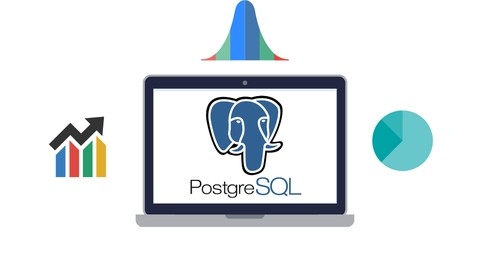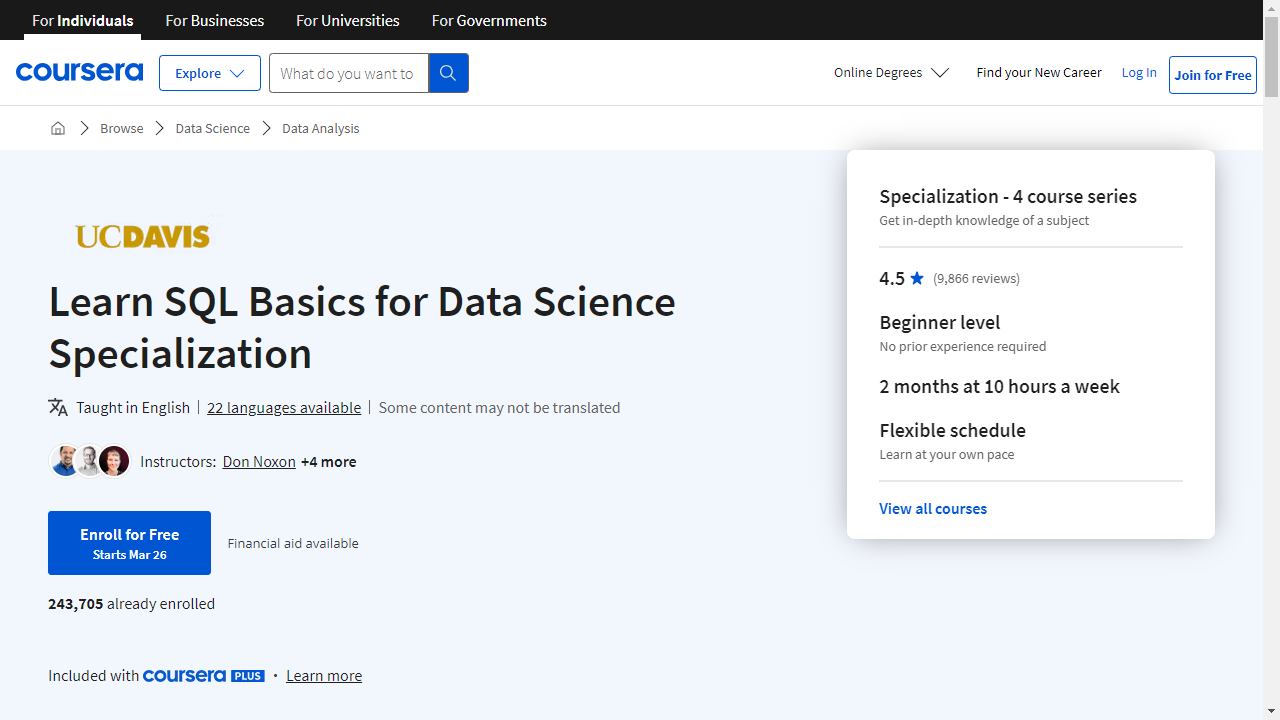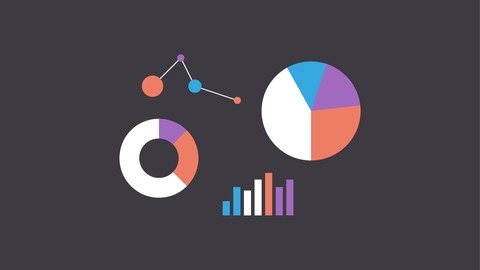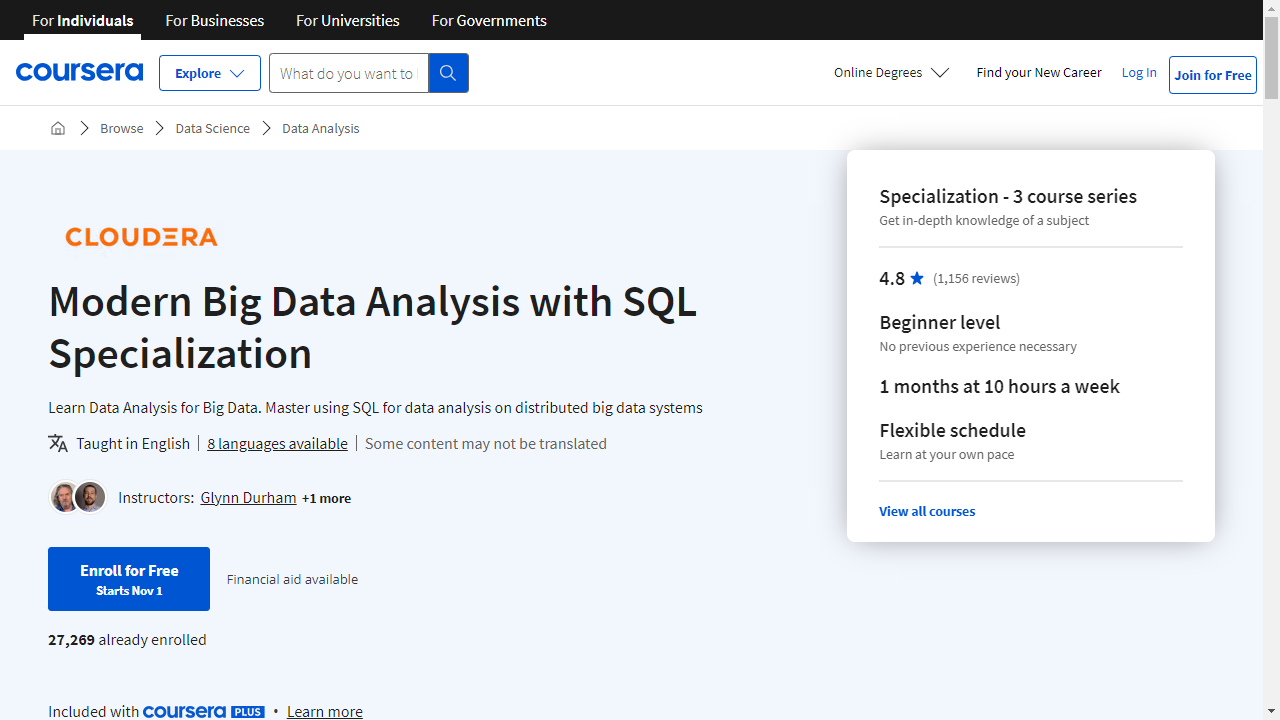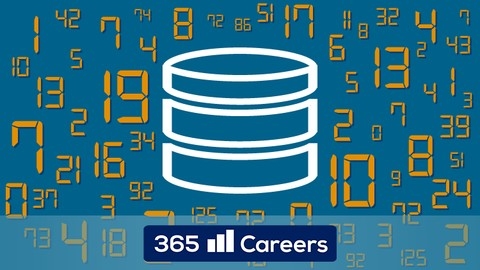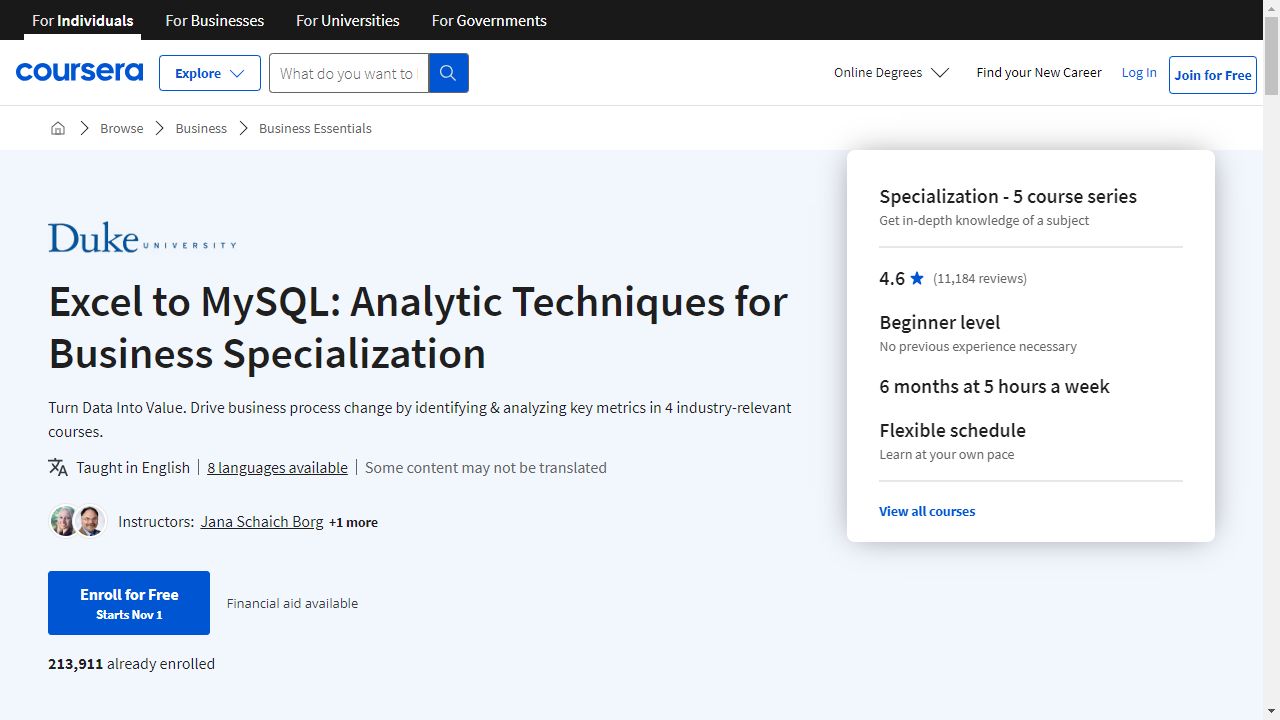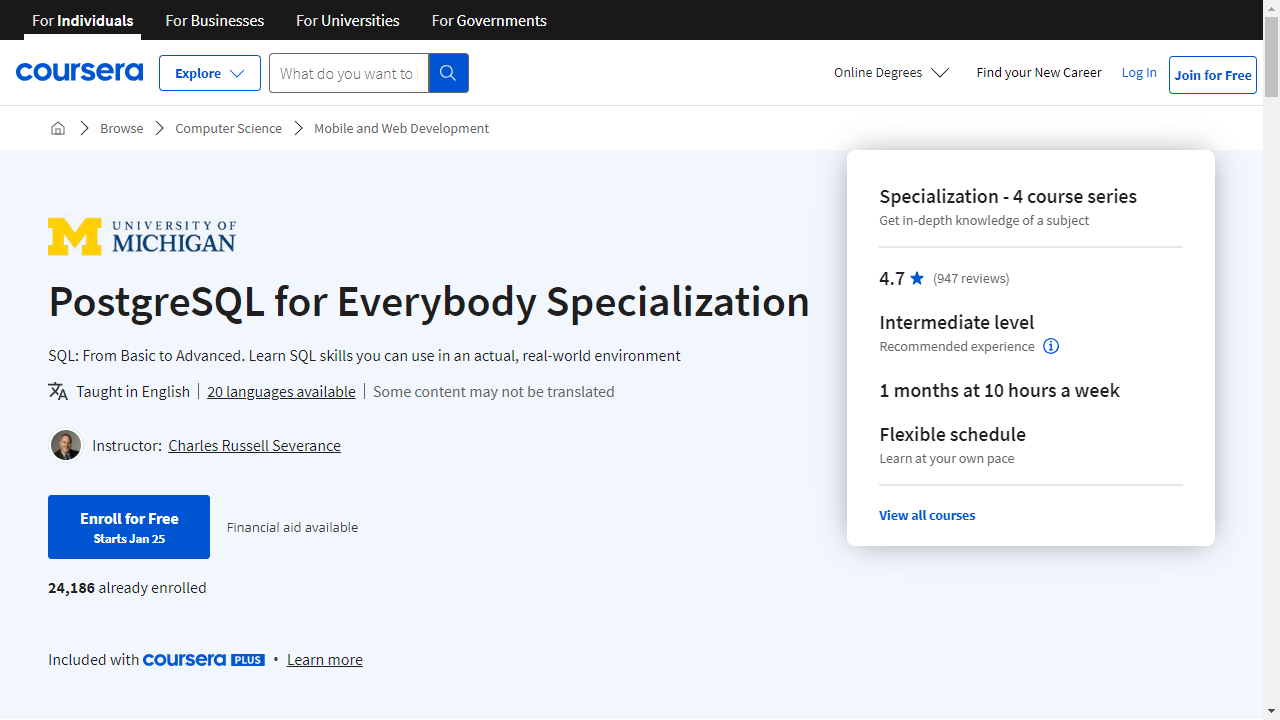SQL (Structured Query Language) is the cornerstone of interacting with relational databases, the backbone of countless applications and systems.
Learning SQL empowers you to retrieve, manipulate, and analyze data efficiently, opening doors to diverse fields like data analysis, web development, and business intelligence.
Mastering SQL allows you to extract meaningful insights from data, build dynamic applications, and make informed, data-driven decisions.
If you’re seeking a comprehensive and effective SQL course, you’ve likely encountered the challenge of navigating through numerous options, each promising to be the best.
You want a course that builds a strong foundation, covers essential concepts, and provides practical exercises to solidify your understanding.
Based on our in-depth analysis, The Complete SQL Bootcamp: Go from Zero to Hero on Udemy stands out as the best SQL course overall.
This bootcamp provides a comprehensive curriculum, covering fundamental concepts like querying, filtering, and joining data, while also delving into advanced topics like database management and working with dates and times.
Its hands-on approach and engaging instructor make it an ideal choice for beginners and those seeking to enhance their SQL skills.
While The Complete SQL Bootcamp: Go from Zero to Hero is our top recommendation, there are other excellent courses tailored to specific needs and learning preferences.
Continue reading to explore a curated selection of courses designed for beginners, aspiring data scientists, and those seeking expertise in specific database systems like MySQL and PostgreSQL.
The Complete SQL Bootcamp: Go from Zero to Hero
Provider: Udemy
This course takes you from SQL newbie to expert.
You build a strong foundation by learning about statements like SELECT to query data, WHERE to filter it, and ORDER BY and LIMIT to arrange and limit your results.
You then master GROUP BY to analyze data in groups and HAVING to filter those groups.
You will then dive into the world of JOINs.
You learn to use INNER JOINs, LEFT OUTER JOINs, RIGHT JOINs, and FULL OUTER JOINs.
You also discover how to use UNION to combine results from multiple queries.
The course then moves on to advanced commands.
You learn to use Timestamps, Extract, and TO_CHAR to work with dates and times, along with Mathematical Functions and String Functions to manipulate data for valuable insights.
You then discover how to build and manage your own databases and tables.
You learn how to use CREATE Table to create tables and commands like INSERT, UPDATE, and DELETE to manage the data within them.
You also explore how to use constraints, including CHECK Constraint to maintain your data’s integrity.
The course also introduces conditional expressions.
You learn to use CASE for conditional logic, COALESCE to handle missing values, and NULLIF for specific comparisons.
Finally, the course shows you how to use psycopg2.
This powerful Python library lets you connect to and interact with PostgreSQL databases, opening up a world of possibilities for data analysis and automation.
Learn SQL Basics for Data Science Specialization
Provider: Coursera
This Specialization equips you with fundamental SQL skills tailored for aspiring data scientists.
You begin by grasping the basics of SQL, learning to pinpoint specific data within tables, manipulate various data types like strings and numbers, and filter results effectively.
As you progress, you learn to construct new tables, transfer data, utilize common operators, and combine datasets.
The course further delves into case statements, data governance principles, and the nuances of data profiling.
You sharpen your skills through real-world programming assignments, interpreting the intricate structure and relationships within data, ultimately mastering the art of shaping data for targeted analysis.
You then transition to applying your honed SQL skills in the “Data Wrangling, Analysis, and AB Testing with SQL” course, tackling real-world data science projects.
You acquire practical techniques for converting timestamps, selecting appropriate joins for analysis, ensuring data cleanliness, and leveraging windowing functions to segment and analyze data effectively.
This course solidifies your foundation in data analysis and equips you with the fundamentals of A/B testing.
For those intrigued by the challenges of large datasets, the “Distributed Computing with Spark SQL” course awaits.
This course introduces you to Apache Spark, a powerful open-source framework designed to handle massive datasets.
You delve into the intricacies of Spark architecture, optimize queries for enhanced performance, and master the art of building reliable data pipelines.
The course also covers Delta Lake, a valuable tool for constructing robust and scalable data lakehouse architectures.
Finally, you consolidate your expertise in the “SQL for Data Science Capstone Project.”
You select a dataset, meticulously craft a project proposal, delve into exploratory data analysis, and uncover insightful analytics from qualitative data.
The course guides you in presenting your findings convincingly, providing valuable feedback to refine your approach to data analysis using SQL and equipping you with the skills to communicate your insights effectively to clients and management.
The Ultimate MySQL Bootcamp: Go from SQL Beginner to Expert
Provider: Udemy
This course takes you from SQL newbie to confident database user.
You begin by installing MySQL on your Windows or Mac computer.
You then learn how to create databases and tables and use SQL commands like INSERT, UPDATE, DELETE, and SELECT to manage your data.
The course gradually introduces more advanced SQL concepts, like string functions for working with text, aggregate functions for calculations, and joins for combining data from multiple tables.
You will explore different data types, such as CHAR, VARCHAR, INT, and DATE, and learn how to work with them effectively.
You will master comparison and logical operators to build precise queries and become comfortable using constraints and the ALTER TABLE statement to modify your database structure.
The course uses practical examples, like building a simplified Instagram database, to help you understand these concepts in a real-world context.
You’ll delve into relationships between tables, learning about one-to-many and many-to-many relationships and how to implement them using foreign keys and different types of JOIN operations.
This course even covers using SQL with other programming languages like Node.js and JavaScript.
You’ll discover how to use Express, NPM, and EJS to build a web application that interacts with your MySQL database.
Modern Big Data Analysis with SQL Specialization
Provider: Coursera
You’ll embark on a journey into the world of big data, starting with the fundamentals of SQL and its application in analyzing massive datasets.
You’ll learn how to differentiate between various database types, understand the importance of database design, and even set up your own virtual machine environment to practice your newfound knowledge.
The course then delves deeper into the intricacies of SQL, guiding you through the nuances of the SELECT statement, a fundamental element of SQL queries.
You’ll gain proficiency in filtering, grouping, and sorting data, ultimately learning how to extract meaningful insights from large datasets.
This exploration will expose you to powerful SQL engines like Apache Hive and Apache Impala, commonly used in big data analysis.
Finally, you’ll conquer the challenge of managing those massive datasets.
The course will equip you with the knowledge to load data into clusters and cloud storage, leveraging distributed SQL engines like Apache Hive and Apache Impala.
You’ll understand how to pick the best data types, storage systems, and file formats to optimize your data analysis process.
SQL - MySQL for Data Analytics and Business Intelligence
Provider: Udemy
This SQL course begins by teaching you the fundamentals of databases, SQL, and MySQL.
You’ll learn why SQL is essential for working with data, regardless of your specific field, whether it’s Business Intelligence (BI), data science, database administration, or back-end development.
The course explains important database concepts like records, fields, data tables, and entities, and you’ll discover how to create, alter, and manage tables using SQL’s Data Definition Language (DDL) with statements such as CREATE, ALTER, RENAME, and TRUNCATE.
You’ll gain hands-on experience by installing MySQL and using MySQL Workbench to write and execute queries.
You will learn how to create databases and tables, insert, update, and delete data, and use various SQL statements and clauses.
The course guides you through using a real-world “employees” database, providing practical experience with the SELECT statement, a fundamental SQL command used to retrieve data.
You’ll explore options within the SELECT statement, including WHERE for filtering data, ORDER BY for sorting results, and LIMIT for controlling the number of rows retrieved.
You’ll then explore advanced SQL concepts like different types of JOINs, including INNER JOIN, LEFT JOIN, RIGHT JOIN, and CROSS JOIN.
You’ll learn how to use subqueries to perform operations within other queries, create views to simplify complex queries, and utilize stored routines like stored procedures and user-defined functions.
The course also covers advanced topics such as MySQL variables, triggers, indexes, window functions, and common table expressions (CTEs).
Finally, you’ll discover how to integrate SQL with Tableau, a data visualization tool, to create insightful charts and dashboards.
Excel to MySQL: Analytic Techniques for Business Specialization
Provider: Coursera
This specialization equips you with in-demand data analysis skills using tools like Excel, MySQL, and Tableau.
You’ll start by mastering data analysis in Excel, going beyond basic functions to build predictive models for real-world situations, such as assessing credit card default risk.
You’ll learn to quantify uncertainty using metrics like confidence intervals, ensuring your predictions are reliable and actionable.
Then, you’ll delve into the world of relational databases with MySQL, a powerful tool for managing large datasets.
You’ll learn to design entity-relationship diagrams, which visually represent the structure of data, and master the art of SQL queries to extract specific information from databases.
This empowers you to directly access and analyze data, giving you a significant advantage in today’s data-driven world.
You’ll also learn how to communicate complex data insights visually with Tableau.
This popular data visualization program allows you to create compelling dashboards and tell captivating data stories, making your findings accessible and impactful for any audience.
Mastering Tableau ensures your analysis leads to real-world action and drives business outcomes.
Finally, you’ll apply everything you’ve learned in a Capstone Project for Watershed Property Management, Inc. You’ll use real estate data to develop a strategy for increasing their profits, demonstrating your data analysis prowess.
This project offers a chance to solidify your skills, receive feedback from experts at Airbnb, and showcase your capabilities to potential employers.
SQL for Beginners: Learn SQL using MySQL and Database Design
Provider: Udemy
This SQL for Beginners course teaches you everything you need to know to start working with databases.
You will learn by installing MySQL on Windows, Mac, or Linux, and then explore databases, relational databases, and SQL.
You will use MySQL Workbench to manage your databases.
The course will teach you Data Definition Language (DDL) to define the structure of your tables, including data types, primary and foreign keys, and Data Manipulation Language (DML) to work with data in your tables, including inserting, updating, and deleting entries.
You will learn how to select data from tables using powerful tools like the WHERE clause, IN and NOT IN operators, the BETWEEN operator, the LIKE operator, and ORDER BY, and how to combine data from multiple tables using different types of joins, such as inner joins, left joins, and right joins.
You will then learn Database Normalization to create efficient databases and understand the different forms of normalization, including 1NF, 2NF, and 3NF, and how to create ERDs.
The course covers aggregate functions like COUNT, SUM, MIN, MAX, and AVG, subqueries to perform complex queries, and MySQL string and date functions to manipulate text and dates.
Finally, you will put everything you’ve learned into practice by creating a Cinema Booking System database.
You will test your understanding of all the concepts covered with challenging exercises.
PostgreSQL for Everybody Specialization
Provider: Coursera
This specialization equips you with the skills to effectively design, manage, and query data using PostgreSQL.
The learning path starts with the fundamentals of database design and SQL.
You learn to create tables, define their structures, and use commands like INSERT INTO, WHERE, and ORDER BY to manage your data.
You also learn how to establish relationships between tables, ensuring your data is organized logically and efficiently.
The course then guides you through more advanced SQL concepts, such as aggregation, which helps you summarize data, and transactions, which ensure data consistency.
You will work with CSV files, learning how to import and process external data.
Mastering regular expressions, a powerful tool for pattern matching, enables you to perform sophisticated searches within your database.
Next, you will delve into the world of JSON and Natural Language Processing.
PostgreSQL excels at handling JSON data, and you will learn how to leverage its capabilities for storing and querying this widely-used data format.
You will also discover how to create inverted indexes, essential for efficient text retrieval, and even build a simple search engine using PostgreSQL.
Finally, you will explore broader database concepts, including database architecture and the differences between SQL and NoSQL databases like Elasticsearch.
You will gain a deep understanding of ACID and BASE properties, which are critical for ensuring data integrity and availability.
This knowledge will help you make informed decisions about the best database technologies for different use cases.
Also check our posts on:
